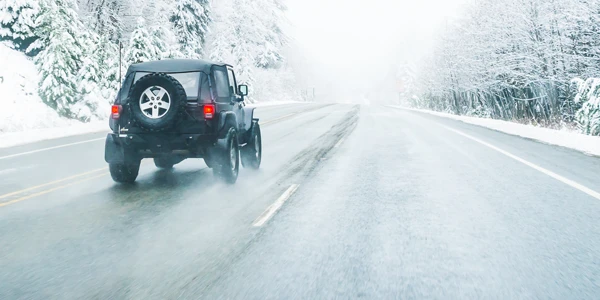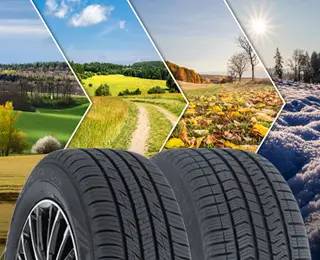When to Choose All-Season or All-Weather Tires
Having the right set of tires on your vehicle is essential for safe driving in any season and weather. Depending on where you live and the storms you face, a set of all-weather or all-season tires with specialized rubber compounds and tread patterns might be ideal for year-round traction and control. We have some tips to help you choose between the best all-season tires versus all-weather tires and what to look for when evaluating durability, traction, comfort, and fuel or range efficiency.
When Winter Tires are the Right Choice
Should you use a set of all-season or all-weather tires in the winter? That depends. If you often face harsh winter weather, including heavy snow and icy roads, winter tires (also called snow tires) may offer the best traction. That’s because winter tires are made especially for optimal performance on winter roads with special rubber that stays flexible under 40º F. Plus, the deep, wide, and jagged tread on snow tires helps maintain traction while the channels move water, slush, and snow away from the tires.
Looking for even more traction? Many winter tires have studded options, giving you more grip on ice. See our article How to Choose Snow Tires for more.
While they do perform well in the snow and ice, winter tires are not recommended for year-round use. That’s where all-season and all-weather tires excel.
Defining All-Season and All-Weather Tires
Both all-season and all-weather tires are designed for year-round use. That means you can put a set of all-season or all-weather tires on your car or truck and use them every day, in almost any weather. However, there are some distinct differences between the two.
All-season tires are ideal for:
- Mild climates that occasionally get snow or dip into freezing temperatures
- Good driving performance in spring, summer, fall, and some winter conditions
- Dry and wet roads
All-season tires are not ideal for:
- Extreme winter driving
- Ice-covered roads
- Temperatures far below freezing
The tread compound found in most all-season tires is designed to stay flexible and grip the road in warmer temperatures. As the temperatures drop, so does the control offered by all-season tires, which makes them less than ideal for severe snow conditions. When the temperatures plummet, the rubber in all-season tires hardens, increasing stopping distance and reducing control. Read Are All-Season Tires Okay in the Snow for more.
All-weather tires are ideal for:
- Colder climates that don’t require a dedicated set of snow tires
- Excellent driving performance all year long
- Good traction on wet roads thanks to deep tread grooves and specialized sipes
All-weather tires are not ideal for:
- Severe winter driving condition
- Warm-weather regions
- Giving your vehicle a rugged look
All-weather tires are sometimes quieter than all-season tires, thanks to a specialized tread pattern that grips the road in any season. Because they carry the 3-Peak Mountain Snowflake (3PMSF) rating, all-weather tires qualify as winter traction tires for harsher winter conditions.

Evaluating All-Season and All-Weather Tire Performance
The tires you choose for your car or truck have a direct impact on performance, safety, fuel or range efficiency, and road noise inside the cab. Let’s take a quick look at traction and handling, comfort and noise, as well as miles per gallon or charge with both all-season and all-weather tires.
Traction and Handling
- Both excel at cornering, braking, and acceleration on dry and wet roads. However, the rubber compound in all-season tires is specially designed for warmer temperatures, making it ideal for warm climates.
- Both offer traction in snow and some ice. But, all-weather tires are severe-weather rated, featuring the 3PMSF logo on the sidewall.
Comfort and Noise
- All-season and all-weather tires are built for comfort and a quiet ride. However, all-weather tire tread patterns, which are not as deep or jagged, often provide a quieter and more comfortable ride.
Fuel or Range Efficiency
- Depending on the rolling resistance, both all-season and all-weather tires can help maximize your overall miles per gallon or distance per charge.
Seasonal Suitability
If your region enjoys a mild climate, including rain, sunshine, and the occasional snowstorm, all-season tires could be the right choice — especially if you like added control on hot summer roads. All-weather tires, in contrast, are designed for facing more severe winter storms or traveling over mountain passes. Both options perform well year-round, but all-season tires are better in the heat, while all-weather tires are optimized for more severe winter conditions.
Which Tire is Right for You?
Les Schwab can help you decide between a set of all-season, all-weather, or a seasonal change-out to winter tires. That includes showing you the differences in tread compounds and patterns for traction on dry, wet, and snow-covered roads, as well as year-round performance and comfort. Stop by or schedule an appointment to get the answers, tires, and other safety services you need at a Les Schwab near you.
What you need to know

Summer Tires vs All-Season Tires: Which Are Best for You?
Let us help you understand the differences between summer, all-season, and performance tires and decide which gets you better traction and performance.

Are All-Season or All-Weather Tires Okay in the Snow?
Understand the differences between all-season, all-weather, and winter tires and match the best tire to your winter driving needs.

When to Choose All-Terrain Tires or All-Weather Tires
Wondering what the difference between all-terrain and all-weather tires is? Read this article to find out the key differences, and which tire suits you best.

